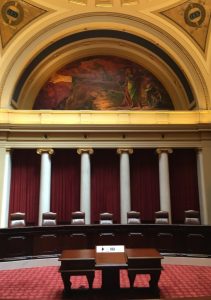Strict Compassion – A Weekly Letter From Rabbi Davis – July 20, 2018
Shalom Chaverim,
Whenever we host visitors from out of town, we end up revisiting local tourist attractions. Last weekend, for example, we went to the State capital with the shlichah we are hosting from Israel. I have been to the capital many times but rarely as a tourist. I love learning about the history, art and architecture that reflect the values that undergird our government.
On my recent tour, I was struck by the chamber of the Supreme Court. Immediately as I walked in, I saw above the judges’ chairs a large mural of Moses receiving the Torah on Mt Sinai. Called Moral and Divine Law (1903) by John La Farge, it depicts the mountain aflame, Joshua holding the Israelites back and Aaron bowed in submission. It is not exactly how I picture the revelation; but it fills me with pride to see a scene from our Torah in such a prominent place.
I saw above the judges’ chairs a large mural of Moses receiving the Torah on Mt Sinai. Called Moral and Divine Law (1903) by John La Farge, it depicts the mountain aflame, Joshua holding the Israelites back and Aaron bowed in submission. It is not exactly how I picture the revelation; but it fills me with pride to see a scene from our Torah in such a prominent place.
Leaving the chamber, my attention was drawn to a brass plaque just to the left of the entrance. It reads, “The best way to get a bad law repealed is to enforce it strictly.” The plaque attributes the quote to Abraham Lincoln although more likely, it was Ulysses S. Grant who made these words famous in his first inaugural address. Grant had faith that people would be able to distinguish good and bad laws and that they would act to protest bad laws rigidly applied. It is a lesson we are still learning.
As Jews, we are familiar with the strict application of law. Rabbi Yochanan went so far as to teach that Jerusalem was destroyed because the court applied the laws too strictly (BM 30b). Instead he says, the court should have gone beyond the letter of the law and judged with kindness and understanding. They should have ruled with strict compassion rather than impose harsh decrees. Their failure to do so was disastrous for the Jewish people. For, just as they judged others harshly, so did God judge them harshly. Unworthy of Divine protection, their Temple which housed the high court was destroyed and they were sent into exile.
On Saturday night and Sunday we will observe Tisha B’av to recall this history and to mourn this tragedy. This year, the holiday’s message is as important as ever. As Jews and as Americans, we are called upon not only to follow the law but to know when we must go beyond the letter of the law. We must critically distinguish good laws from bad ones to ensure that our democratic and Divine laws are also moral. Only then will we turn lamentations into rejoicing as Isaiah prophesied, “Zion will be redeemed with justice” (1:27).
L’Shalom,
Rabbi Alexander Davis
adavis@bethelsynagogue.org
